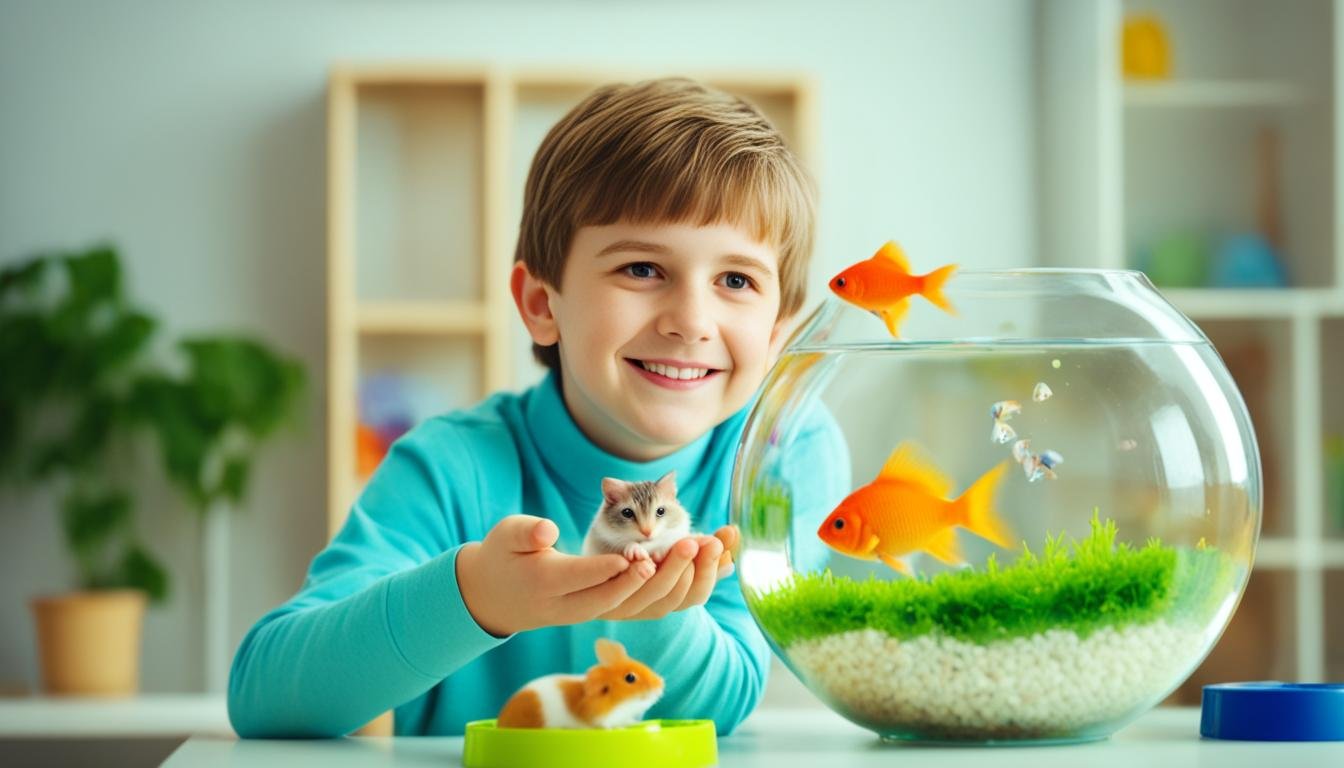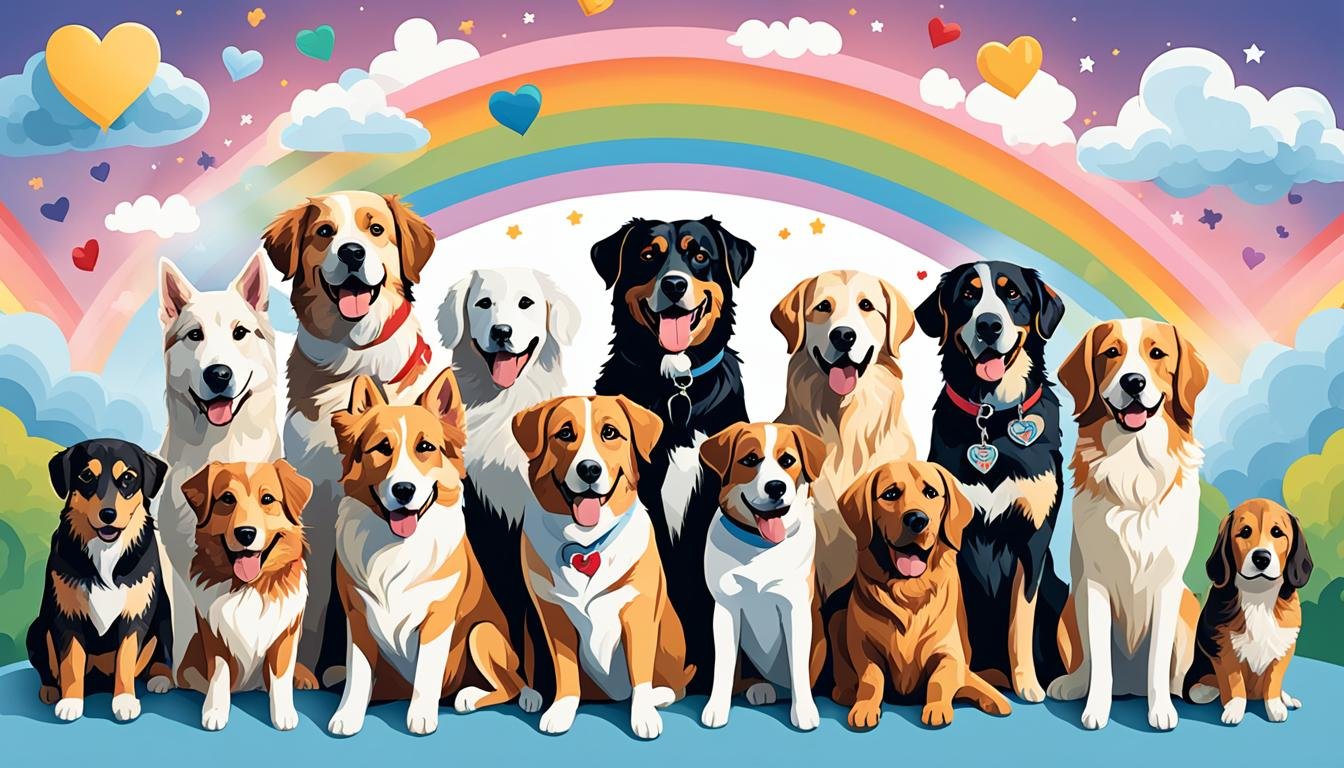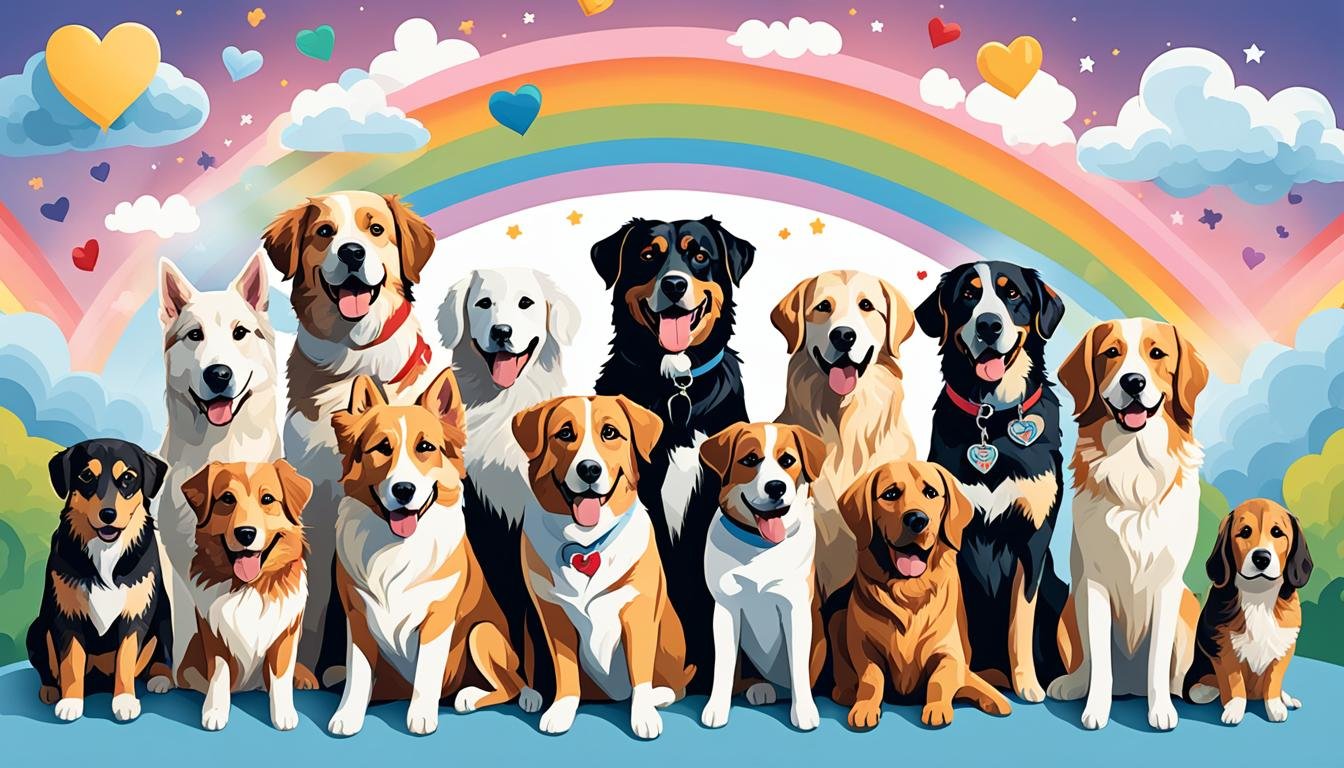Did you know that 1.5 million Brits own rabbits as pets1? When it comes to finding the easiest pet for a 12-year-old, the options may seem overwhelming. However, with careful consideration of factors such as care requirements, space needs, lifespan, and the child’s ability to provide responsible care, the decision can become much clearer. In this article, we’ll explore the best pet choices for a 12-year-old, ensuring a rewarding and satisfying experience for both the child and the family.
Key Takeaways
- Consider factors like pet care requirements, space needs, lifespan, and the child’s responsibility level when choosing a pet.
- Rabbits, guinea pigs, and bearded dragons are often among the easiest pets for a 12-year-old to care for.
- Pets can teach children responsibility, companionship, and improved social and cognitive skills.
- Small pets like hamsters and gerbils may have shorter lifespans, but can be a good introduction to pet ownership.
- Larger, longer-lived pets like dogs and cats require more commitment and may not be the best choice for a 12-year-old’s first pet.
Benefits of Having a Pet for Kids
Having a pet can provide a wide range of benefits for children, from offering companionship and emotional support to teaching responsibility and improving social and cognitive skills2. Over 40% of 5-year-old pet owners mentioned turning to their pets when feeling sad, angry, afraid, or needing to share a secret2. Children exposed to two or more dogs or cats as babies are less than half as likely to develop common allergies compared to those with no pets2.
Companionship and Emotional Support
Pets can offer unconditional love and acceptance, helping children feel valued and building their self-confidence3. A pet offers companionship and can be a loyal friend, particularly important during times of increased loneliness and when children need nonjudgmental support3. Petting a pet rhythmically can help lower stress and anxiety, regulating heart rate and supporting emotional regulation3.
Teaching Responsibility
Caring for a pet teaches children responsibility, as they learn to feed, groom, and attend to the animal’s needs3. Pets provide an opportunity for children of any age to learn and practice responsibility3. Specific responsibilities can be tailored to each age group to teach cause and effect and the importance of caring for another living being3.
Improved Social and Cognitive Skills
Interacting with pets can improve children’s social and cognitive skills, such as communication, problem-solving, and empathy3. Children learn to read body language and understand nonverbal cues, which can help them navigate human relationships3. A 2017 literature review concluded that there was evidence supporting an association between pet ownership and emotional health benefits, particularly for self-esteem and loneliness in children2.
Overall, the benefits of having a pet for kids are numerous and can positively impact their emotional, social, and cognitive development. From providing companionship and emotional support to teaching responsibility and improving social skills, pets can be a valuable addition to a child’s life.
What is the easiest pet for a 12 year old?
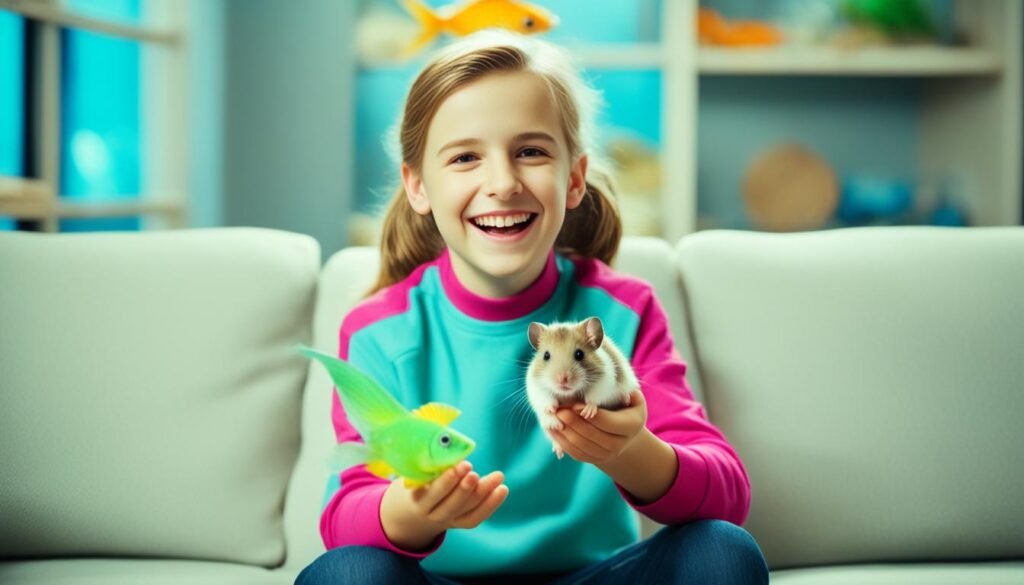
When it comes to choosing the easiest pet for a 12-year-old, several factors come into play. Experts recommend considering the child’s level of maturity, the pet’s care requirements, and the family’s lifestyle4. For instance, parakeets are often suggested as a good pet option for kids aged 4-7 due to their low-maintenance nature and small size4. Crested geckos, on the other hand, are unique and suitable pets for children but require gentle handling and adaptation to their living environment4.
For 12-year-olds, pets that are relatively low-maintenance, such as fish, guinea pigs, and bearded dragons, are often the easiest choices5. These animals typically have straightforward care needs, don’t require extensive outdoor space, and can tolerate gentle handling by a responsible child5. Additionally, it’s crucial to ensure that the child is genuinely interested in and committed to caring for the pet, with support from the parents or guardians.
| Pet | Average Lifespan | Recommended Age | Maintenance Level |
|---|---|---|---|
| Fish | Varies by species | 4+ years old | Low |
| Guinea Pigs | 5-7 years | 8+ years old | Moderate |
| Bearded Dragons | 10-15 years | 8+ years old | Moderate |
When selecting the easiest pet for a 12-year-old, it’s important to consider the child’s maturity, the pet’s care requirements, and the family’s lifestyle. Pets that are relatively low-maintenance, such as fish, guinea pigs, and bearded dragons, are often the best choices for this age group5.
“Choosing the right pet for a 12-year-old can be a delicate balance between the child’s interest, the family’s commitment, and the pet’s care requirements.”
Ultimately, the easiest pet for a 12-year-old will depend on the individual child, their level of responsibility, and the support of their family. By considering these factors, families can find the perfect low-maintenance pet that will provide companionship, teach responsibility, and enhance the child’s overall well-being.
Top Pet Choices for 12-Year-Olds
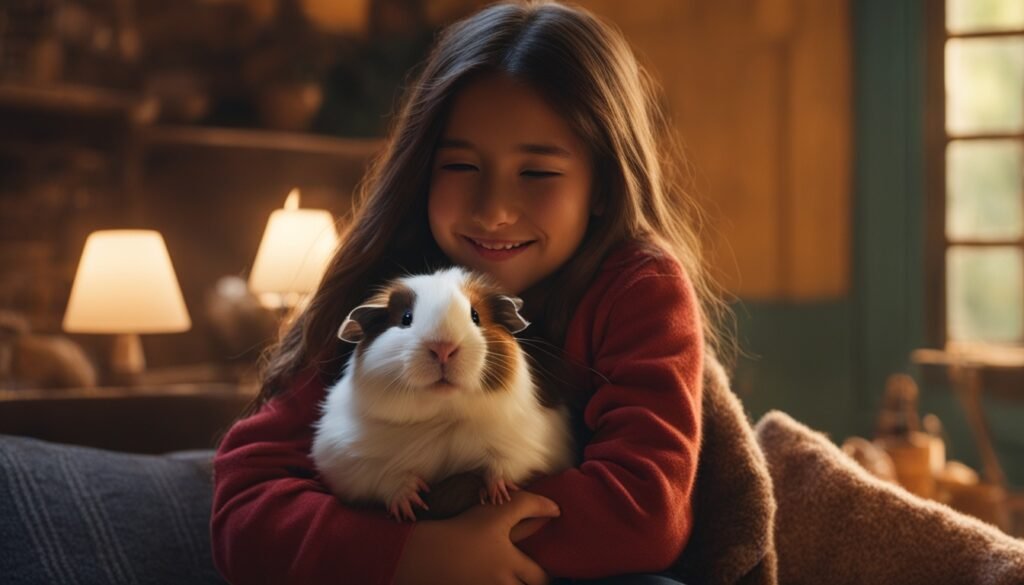
When it comes to the best pets for 12-year-olds, several options stand out as family-friendly and low-maintenance choices. Dogs and cats, guinea pigs, and bearded dragons are among the top picks that can provide companionship, teach responsibility, and offer educational opportunities for this age group.
Dogs and Cats
Dogs and cats are perennial favorites among children, and for good reason. Studies have found that pet ownership can provide psychological and physical health benefits for children, such as reduced stress and heightened social skills6. Additionally, owning a dog or cat can lead to improved language and reading skills, as well as cognitive skills6. Dogs are considered one of the most popular pets for kids due to their loyalty, friendliness, intelligence, and low-maintenance nature6. Cats are known for being great pets for kids as they are relatively low-maintenance, smart, affectionate, and entertaining6. However, both dogs and cats require a significant time commitment and ongoing care, so families must be prepared for the responsibility.
Guinea Pigs
Guinea pigs are increasingly popular among children and are known to be affectionate, fostering a child’s sense of responsibility6. These small, furry creatures are relatively low-maintenance, making them an excellent choice for 12-year-olds who want a pet but may not have the time or resources to care for a more demanding animal. Guinea pigs typically live for about three to five years7, providing a longer-term companionship for children during this formative age.
Bearded Dragons
Bearded dragons are another excellent option for 12-year-olds. These lizards are low-maintenance pets that provide educational benefits and teach children responsibility6. Bearded dragons typically live for five to eight years, with proper care they can live up to 10 years7. Their calm demeanor and fascinating behavior make them engaging companions for children interested in learning about reptiles.
Ultimately, the best pet for a 12-year-old will depend on the child’s interests, the family’s resources, and the ability to provide the necessary care and commitment. By considering the unique needs and benefits of different pet options, families can make an informed decision that will enrich the life of a 12-year-old and foster a lifelong love of animals.
Conclusion
Choosing the right pet for a 12-year-old involves carefully considering the child’s interests, the pet’s care requirements, and the family’s lifestyle8. While there are many great options, such as dogs, cats, guinea pigs, and bearded dragons, the key is finding a pet that aligns with your child’s personality and ability to provide responsible care910., By selecting the appropriate pet and fostering a positive, nurturing relationship, you can help your 12-year-old enjoy the numerous benefits of pet ownership, including companionship, emotional support, and the development of important life skills.
No matter which pet you choose, the most important factor is ensuring that your child is ready and capable of providing the necessary care and attention. With the right approach, your 12-year-old can gain valuable experiences and form a lifelong bond with their furry, feathered, or scaly friend. By considering the unique needs and characteristics of each pet, you can help your child embark on a rewarding journey of pet ownership that will enrich their life in countless ways.
As you navigate the process of selecting the perfect pet for your 12-year-old, remember to prioritize their interests, your family’s lifestyle, and the pet’s well-being. With careful consideration and a commitment to responsible pet ownership, you can help your child unlock the countless benefits of having a loyal companion by their side.
FAQ
What is the easiest pet for a 12-year-old?
When choosing the easiest pet for a 12-year-old, it’s important to consider the child’s level of maturity, the pet’s care requirements, and the family’s lifestyle. Experts recommend pets that are relatively low-maintenance, such as fish, guinea pigs, and bearded dragons. These animals often have straightforward care needs, don’t require extensive outdoor space, and can tolerate gentle handling by a responsible child.
What are the benefits of having a pet for kids?
Having a pet can provide numerous benefits for children, including companionship, emotional support, and the development of important life skills. Pets can offer unconditional love and acceptance, helping children feel valued and building their self-confidence. Caring for a pet also teaches children responsibility, as they learn to feed, groom, and attend to the animal’s needs. Additionally, interacting with pets can improve children’s social and cognitive skills, such as communication, problem-solving, and empathy.
What are the top pet choices for 12-year-olds?
Among the top pet choices for 12-year-olds are dogs and cats, guinea pigs, and bearded dragons. Dogs and cats can provide companionship, teach responsibility, and encourage physical activity, but require more intensive care and attention. Guinea pigs are relatively low-maintenance, affectionate, and can help children develop empathy and care for living creatures. Bearded dragons are also easy to care for, fascinating to observe, and can serve as educational companions for children interested in learning about reptiles.

